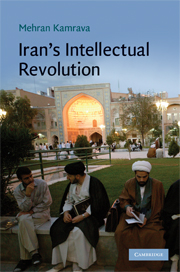Book contents
- Frontmatter
- Contents
- List of tables
- Acknowledgments
- 1 Introduction
- 2 Emerging Iranian discourses
- 3 Theorizing about the world
- 4 The conservative religious discourse
- 5 The reformist religious discourse
- 6 The secular-modernist discourse
- 7 Iran's silent revolution
- Bibliography
- Index
- Cambridge Middle East Studies 29
6 - The secular-modernist discourse
Published online by Cambridge University Press: 06 July 2010
- Frontmatter
- Contents
- List of tables
- Acknowledgments
- 1 Introduction
- 2 Emerging Iranian discourses
- 3 Theorizing about the world
- 4 The conservative religious discourse
- 5 The reformist religious discourse
- 6 The secular-modernist discourse
- 7 Iran's silent revolution
- Bibliography
- Index
- Cambridge Middle East Studies 29
Summary
Of all the dilemmas and challenges facing contemporary Iran, one of the most pressing is the force and momentum of modernity. Modernity is a phenomenon that cannot be stopped. It is a phase in the evolution of humanity that started in earnest in eighteenth-century Europe and has now come to engulf all aspects of human life and thought. Those societies and governments that somehow try to resist or negate this inevitable process only marginalize themselves and the communities they govern. At best, they selectively pick and choose those aspects of modernity that they find politically and culturally least objectionable. At worst, in an attempt to safeguard some supposed social, cultural, and political authenticity, they erect ostensibly insurmountable barriers to what they perceive to be the intrusion of modern norms, practices, and institutions. The central task facing those hitherto robbed of the fruits of modernity is to articulate and implement their own conceptions of modernity. What needs to occur is first to understand the nature and gravity of the problem of being unmodern, and then to devise feasible and meaningful strategies of reaching and accommodating modernity.
This, in a nutshell, is the essence of the arguments made by a growing number of contemporary Iranian intellectuals. Central to their scholarly outputs – which is almost exclusively through books – is the notion of modernity and a host of attendant questions – what is it, what social and political consequences does it have for those affected by it, and what explains the extent to which it has gained resonance or has been absent from Iranian society?
- Type
- Chapter
- Information
- Iran's Intellectual Revolution , pp. 173 - 213Publisher: Cambridge University PressPrint publication year: 2008



